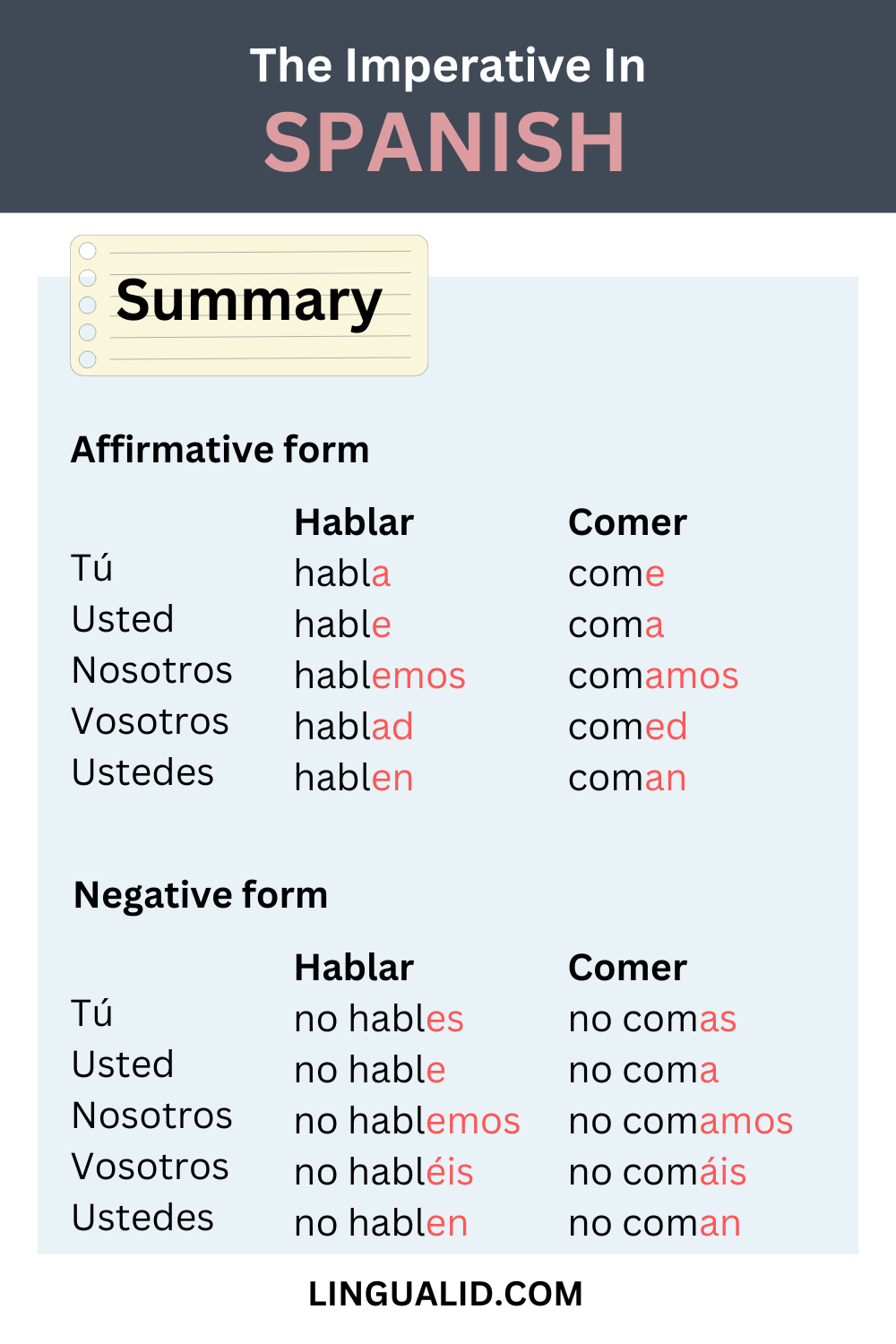In this lesson, we will talk about the imperative in Spanish, and how to use it to give command on both affirmative and negative forms.

The imperative (also known as command) is the tense used when we want to give an order, or recommend or give instructions, and in Spanish, for the regular verbs, it’s formed easily by replacing the endings “ar, er, ir” with the appropriate ending, look at the following tables:
Verbs ending with -AR
| Pronoun | imperative ending |
| Tú | -a |
| Usted | -e |
| Nosotros | -emos |
| Vosotros | -ad |
| Ustedes | -en |
Example: Estudiar (to study):
| Pronoun | imperative |
| Tú | estudia |
| Usted | estudie |
| Nosotros | estudiemos |
| Vosotros | estudiad |
| Ustedes | estudien |
Example: Hablar (to speak)
| Pronoun | imperative |
| Tú | habla |
| Usted | hable |
| Nosotros | hablemos |
| Vosotros | hablad |
| Ustedes | hablen |
Note: you can practice what you’ve learned here, and learn how to pronounce each of the words in our Memrise course here, don’t know how to use the platform or sign up? we’ve got you covered in this easy-to-follow tutorial here.
Verbs ending with -ER and -IR
| Pronoun | imperative ending |
| Tú | -e |
| Usted | -a |
| Nosotros | -amos |
| Vosotros | -ed |
| Ustedes | -an |
Example: aprender (to learn)
| Pronoun | imperative |
| Tú | aprende |
| Usted | aprenda |
| Nosotros | aprendamos |
| Vosotros | aprended |
| Ustedes | aprendan |
Example: comer (to eat)
| Pronoun | imperative |
| Tú | come |
| Usted | coma |
| Nosotros | comamos |
| Vosotros | comed |
| Ustedes | coman |
Example: decidir (to decide)
| Pronoun | imperative |
| Tú | decide |
| Usted | decida |
| Nosotros | decidamos |
| Vosotros | decided |
| Ustedes | decidan |
Example: recibir (to receive)
| Pronoun | imperative |
| Tú | recibe |
| Usted | reciba |
| Nosotros | recibamos |
| Vosotros | recibed |
| Ustedes | reciban |

The Negative Form Of The Imperative
To use the imperative in its negative form, put the word “No” in front of the verb and then add the appropriate ending:
Verbs ending with AR
| Pronoun | imperative ending |
| Tú | -es |
| Usted | -e |
| Nosotros | -emos |
| Vosotros | -éis |
| Ustedes | -en |
Example: Hablar (to speak)
| Pronoun | imperative (negative) |
| Tú | no hables |
| Usted | no hable |
| Nosotros | no hablemos |
| Vosotros | no habléis |
| Ustedes | no hablen |
Verbs ending with -ER and -IR
| Pronoun | imperative ending |
| Tú | -as |
| Usted | -a |
| Nosotros | -amos |
| Vosotros | -áis |
| Ustedes | -an |
Example: comer (to eat)
| Pronoun | imperative ending |
| Tú | no comas |
| Usted | no coma |
| Nosotros | no comamos |
| Vosotros | no comáis |
| Ustedes | no coman |
Happy learning!
